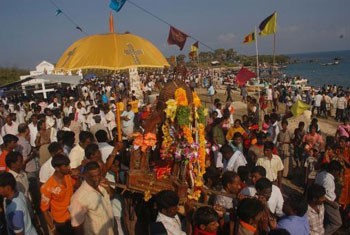 In a unanimous resolution on May 3, 2013, the Tamil Nadu Legislative Assembly demanded that the Government of India should take immediate steps to take back control of Kachchatheevu, a small, barren island in the Palk Bay, which was ceded to Sri Lanka in 1974. The context for reviving the demand is the “continuous violent attacks, torture and arrest of Tamil Nadu fishermen by the Sri Lankan Navy”.
In a unanimous resolution on May 3, 2013, the Tamil Nadu Legislative Assembly demanded that the Government of India should take immediate steps to take back control of Kachchatheevu, a small, barren island in the Palk Bay, which was ceded to Sri Lanka in 1974. The context for reviving the demand is the “continuous violent attacks, torture and arrest of Tamil Nadu fishermen by the Sri Lankan Navy”.
During the last three decades the rich fishing grounds, especially lucrative on the Sri Lankan side of the maritime boundary, have become a bone of contention among fishermen in Tamil Nadu, Sri Lankan Tamil fishermen and Sri Lankan Navy. Nearly 400 Indian fishermen have been killed in incidents of firing, several boats have been destroyed, many fishermen have been injured and catch worth crores of rupees have been dumped into the sea.
Kachchatheevu: A Short History & Unknown Facts
Kachchatheevu is a tiny island, 285.2 acres in area, with not even a drop of drinking water, located ten miles northeast of Rameshwaram. Traditionally, the island was frequented by Indian fishermen, who used it as a staging post to dry their nets and their catch. There is also a Catholic church, dedicated to St. Anthony. Pilgrims from both countries visit the island every year at the end of March for a week-long festival. Kachchatheevu was part of the zamindari of Raja of Ramnad; when zamindari was abolished it became a part of Madras Presidency. All official records relating to the zamindari of Raja of Ramnad have been taken away by the Central Government and kept behind the stone walls of official secrecy. However, there are a number of secondary sources relating to lease agreements signed between Raja of Ramnad and various parties for exploitation of marine resources in and around Kachchatheevu, which prove that the island was a part of the zamindari of Ramnad Samasthanam.
The island came into prominence after Independence when the delimitation of maritime boundary in Palk Bay was taken up by two governments. The Sri Lankan side emphatically maintained that Colombo exercised effective control over the island from very early times. In his book, Kachchathevu and Maritime Boundary of Sri Lanka, WT Jayasinghe, former Sri Lankan Foreign and Defence Secretary, does not provide details of the records/documents which can prove Sri Lankan ownership claims. There are no footnotes in the book.
The ceding of Kachchatheevu to Sri Lanka was a political decision taken by two Prime Ministers who were bosom friends. In order to avoid constitutional amendment, New Delhi adopted the stance that the island was a disputed territory. For, if Indian territory is to be ceded to a foreign country, it is obligatory to amend Indian constitution. SP Jagota, then Director of the Legal and Treaties Division, has written, “The boundary line between India and Sri Lanka followed the median line, except as adjusted in the Palk Bay, in relation to the question of Island of Kachchatheevu” (Emphasis added).
Karunanidhi, then the Chief Minister of Tamil Nadu, should have taken the matter to Supreme Court, but, for strange reasons, he did not do so. In 2008, Jayalalitha filed a petition in the Supreme Court appealing that the 1974 and 1976 agreements should be declared null and void; the case is pending before the Supreme Court.
The 1974 Agreement while ceding Kachchatheevu to Sri Lanka, also protects traditional fishing rights enjoyed by Indian fishermen to fish in and around Kachchatheevu. Unfortunately these traditional rights were also given away when the maritime boundary agreement delimiting the Gulf of Mannar and the Bay of Bengal was signed in 1976. The fishermen in Tamil Nadu feel, with justification, that the two agreements have struck a death blow to their livelihood.
Kachchatheevu: The Present Crisis and A Solution
Chief Minister Jayalalitha is on a weak wicket when she claims that the travails of Tamil Nadu fishermen will end if Kachchatheevu is retrieved from Sri Lanka. Indian fishermen go very deep into Sri Lankan waters; they deprive the Sri Lankan Tamil fishermen of their livelihood and Indian trawlers play havoc with marine ecology. The pre-requisite for a fair solution is to recognize that Sri Lankan Tamil fishermen are also major stake holders.
International agreements, however, unjust they might be, have sanctity and they cannot be repudiated by successor governments. If India abrogates the agreement unilaterally, its image will suffer; the best possible solution is to get the Island of Kachchatheevu and the adjoining seas on “lease in perpetuity”, In other words, Tin Bigha in reverse. It is a matter of gratification that Tamil Nadu Government, under the stewardship of both Jayalalitha and Karunandhi, has, on several occasions, suggested this course of action to New Delhi. But the Central Government behaves like Kumbakarna; it does not want to reopen the ownership claims of Kachchatheevu.
Palk Bay should not be viewed as a contested territory, but as common heritage. A dialogue among fishermen should commence and they should come to an agreement as to how resources could be equitably shared and marine resources enriched through joint efforts. For a solution arrived from below has greater chances of success than a solution imposed from above.
Courtesy : Institute of Peace and Conflict Studies (http://www.ipcs.org)